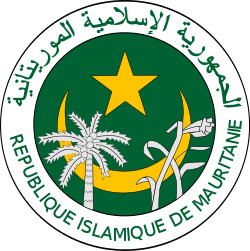2005 Mauritanian coup d'état
 |
| This article is part of a series on the politics and government of Mauritania |
The 2005 Mauritanian coup d'état took place on 3 August 2005. The long-serving dictator Maaouya Ould Sid'Ahmed Taya was ousted by the military of Mauritania and replaced by the Military Council for Justice and Democracy while Taya was in Saudi Arabia attending the funeral of King Fahd bin Abdul Aziz Al Saud. A constitutional referendum, parliamentary and presidential elections were scheduled and the coup leaders vowed not to contest any of the elections. The military government ended with the presidential election on 11 March 2007.
Background
Taya had reigned over Mauritania since he had took power from Mohamed Khouna Ould Haidalla in a bloodless coup. Mauritania had also seen coup d'état attempts in August 2004, and June 2003. The 2003 attempt had been led by Saleh Ould Hanenna, and the August 2004 attempt was allegedly led by army officers hailing from Hannena's ethnic group.[1] Motives for the coup included Taya's alignment with America and being one of only three Arab nations to start formal diplomatic ties with the state of Israel. Other reasons included distaste for his constant purges as well as not taking advantage of the discovery of oil in the area in 2006.[2]
Coup details
While Taya was attending the funeral of Al Saud, members of the Presidential Guard surrounded the presidential palace and other important ministries. Shots were heard throughout the capital, clearing the streets of Nouakchott. The coup leaders also took control of state run radio and TV stations.[3] In an official message on Mauritanian television, the coup leaders declared they "have unanimously decided to put a definitive end to the totalitarian acts in the past few years of the defunct regime under which our people have suffered greatly in the last few years."[2]
International reaction
Domestically, the coup had widespread support from the population, many in the capital honking their car horns in support. The African Union expressed concern and condemned all seizures of power.[4] The Secretary-General of the UN, Kofi Annan, "was deeply troubled", stating that he wanted the dispute to be resolved peacefully. The then President of Nigeria, Olusegun Obasanjo, denounced the coup, stating "the days of tolerating military governance in our sub-region or anywhere [were] long gone".[4]
Aftermath
After the coup, Mauritania was suspended from the African Union, demanding a return to "constitutional order."[5] Membership was returned after the 2007 elections and taken away again after the 2008 coup.[6] Taya was on the plane back to Mauritania when the coup happened, forcing him to land in Niger. He eventually made his way to Qatar.[7] Taya now works as a teacher at a Qatar military school.[8] The military government ended after the first fair elections in 20 years were held in 2007, with the election of Sidi Mohamed Ould Cheikh Abdallahi. However, members of the original coup overthrew him after it was found out that he had opened channels of communications with Islamic hardliners thought to be associated with Al-Qaeda and using public funds to build a mosque in the palace.[9]
References
- ↑ "'Army coup foiled' in Mauritania". BBC News. 11 August 2004.
- 1 2 "Soldiers in Mauritania stage coup". cnn.com. CNN. Retrieved 22 October 2016.
- ↑ "Un nouveau coup d'Etat militaire". www1.rfi.fr (in French). Radio France Internationale. Retrieved 22 October 2016.
- 1 2 "Mauritania officers 'seize power'". bbc.com. BBC. Retrieved 22 October 2016.
- ↑ "The Military Coup in Mauritania: Domestic and International Implications". The Washington Institute. Retrieved 22 October 2016.
- ↑ "All is rather easily forgiven". The Economist. Retrieved 22 October 2016.
- ↑ Bibbo, Barbara (23 August 2005). "Taya lands in Qatar with family". GulfNews. Retrieved 22 October 2016.
- ↑ "Ex-Mauritanian president to teach at Qatar military school". Al-arabiya. Retrieved 22 October 2016.
- ↑ Mohammed, Ahmed. "Mauritania army stages coup; junta takes charge". ap.google.com. AP. Archived from the original on 12 August 2008.